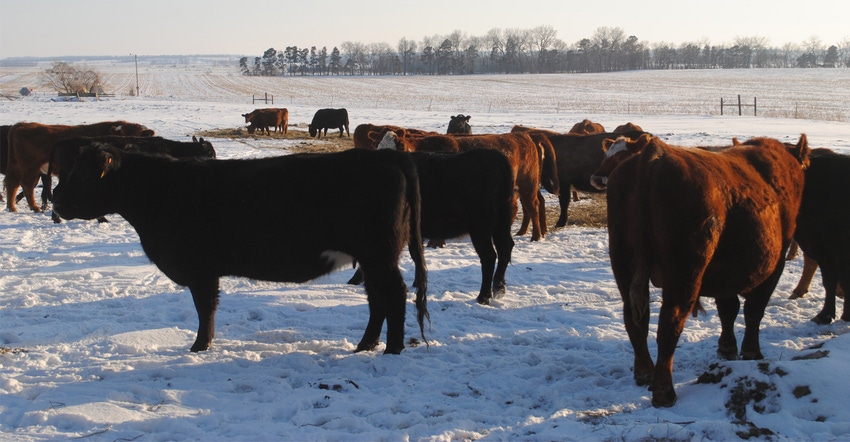January 17, 2019

By Karla Jenkins
In recent months, the shortened supply of distillers grain has reduced the amount many producers can access and increased the price of what is available. This has led producers to evaluate what their supplement options are.
Can I substitute corn for distillers grain for my bred cows?
The short answer is no. Production cows typically are supplemented because they are consuming poor quality hay or range and need protein supplementation to support the microbes in the rumen so the microbes can digest the forage.
Corn contains about 70% starch. Starch has a negative effect on the rumen microbes needed to digest poor quality forages. So, unless an additional source of nitrogen (which comes from protein) also is fed, the cattle likely will perform poorly if corn were substituted for distillers grain.
How expensive is it?
Distillers grain is 30% crude protein and 108% total digestible nutrients (TDN) in forage-based diets. Assuming a producer still can get distillers grain, but at a higher cost than previously purchased, how expensive is it compared with other feed resources?
If a producer must pay $195 per ton for dried distillers grain bought and delivered, that is $221.59 per ton of dry matter ($195 ÷ 0.88, assuming 12% moisture). So, for a ton of dry matter crude protein, the distillers costs $738.64 ($221.59 ÷ 0.3, because it is 30% crude protein).
If a producer bought alfalfa for a protein supplement and paid $185 per ton delivered, and the hay was 18% crude protein, then it costs $215.12 per dry matter ton (185 ÷ 0.86) and $1,195.09 per ton of crude protein ($215.12 ÷ 0.18). While the distillers grain costs more than in previous years, it still is a more cost-effective protein supplement than the alternative in this example.
Producers should evaluate all alternatives based on nutrient content and include any associated transportation and feed delivery costs.
Distillers grain is not available to me. What do I supplement?
Acceptable substitute supplementation for distillers grain depends on the class of livestock fed, the basal diet available and the desired performance. Producers may want to ask Extension beef specialists or educators for ration-balancing assistance for each class of livestock to ensure substitutions meet animal requirements.
If pregnant, nonlactating 1,200-pound cows are in the last trimester of pregnancy, they would require about 1.86 pounds of crude protein and 12.6 pounds of TDN per day. If they were grazing unlimited dormant winter range, then supplementing 6.5 pounds per cow per day of the alfalfa in the example above would meet the cows' needs for protein and energy.
Supplements containing urea also will supply the rumen microbes with the necessary nitrogen, and performance in gestating beef cows is acceptable when readily digestible structural carbohydrates are not limiting.
Forage-testing hay or grass used for the basal diet will help producers determine how much supplement is needed, so overfeeding expensive supplements is minimized.
Jenkins is a Nebraska Extension range management cow-calf specialist. This report comes from UNL BeefWatch, which is solely responsible for the information provided and is wholly owned by the source. Informa Business Media and all its subsidiaries are not responsible for any of the content contained in this information asset.
You May Also Like




